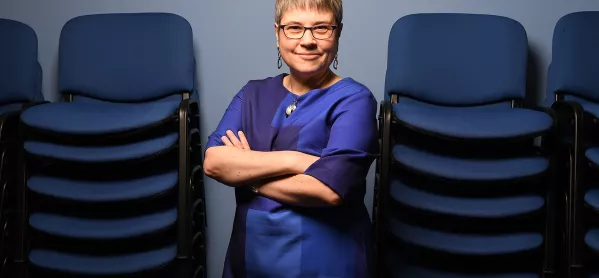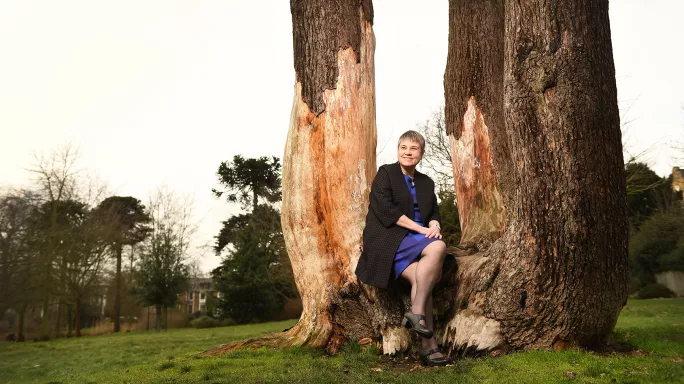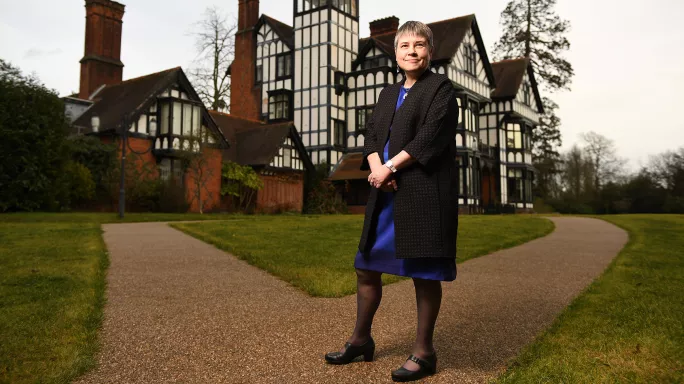- Home
- Meet the educational research chief who is in awe of schools
Meet the educational research chief who is in awe of schools

When Carole Willis speaks, it is with a slow and careful precision, as if consciously weighing the evidential basis for each statement she makes.
And if she is not comfortable that she knows the research well enough on a particular topic, she politely declines to offer a view.
This should not come as a surprise because, since 2013, Willis has been the chief executive of the National Foundation for Educational Research (NFER).
The organisation was founded in 1946 “because there was a concern that more and more money was going into education, but there was very little, if any, evidence on what impact it was having and what the best way of running an education system was”, she says.
Today, it is a highly influential organisation conducting independent research that informs decisions by educational policymakers across a range of issues, from teacher recruitment and assessment to school funding and social mobility.
'I am one of the lucky ones'
An economist by training, Willis says the trajectory of her life is an example of social mobility in action.
She was raised on the Isle of Wight, where her parents ran a greengrocers. She grew up above the shop and attended the local primary school, middle school and then Carisbrooke High School (now Carisbrooke College), a comprehensive in the middle of the island.
“I come from a very low-income background, actually, so I guess I am one of the lucky ones, one of the examples of social mobility,” she says.

“I really enjoyed that structuring of a system, and understanding more about people’s behaviours and how markets work, and different incentives, around the economy,” she explains.
Moving away from her family to study maths and economics at the University of Nottingham was “traumatic”, recalls Willis. After finding maths to be “far too theoretical for me”, she switched to pure economics.
Carole Willis: There's no 'perfect' model for accountability
Carole Willis: We must find a way to stop teachers leaving
Long read: Baseline assessment for pupils in Reception
Instead of having a career plan mapped out, Willis says she has always done things that she enjoys. She liked economics so she joined an economics consultancy, and having become interested in the drivers behind crime, she went on to work in the Home Office in 1997.
It was the first of four Whitehall departments in which she has been employed, with the last being the Department for Education, where she was director of research and analysis, and chief scientific adviser, between 2008 and 2013.
'Evidence is only one factor'
Having seen the workings of government from the inside, and from such a range of viewpoints, to what extent does Willis think evidence effectively feeds into public policy?
“It varies by department," she replies. "Different departments have different approaches to embedding evidence in their decision-making.
“Evidence is only one factor that informs ministerial decisions, of course.
“I think sometimes young researchers think ‘the evidence says this so the government must do things in a certain way’, but it’s never that straightforward, and we live in a democratic country, so it’s absolutely right that ministers draw on a range of different sources of information and different views and values, as well as the evidence, to inform the policy decisions that are then made.”
At the DfE, it seems that the extent to which ministers are guided by evidence depends on the policy area.
When it comes to the government’s teacher recruitment and retention strategy, published in January, Willis says the NFER was “delighted at how open the government has been to exploring some of these issues”, such as putting an increased focus on the retention side of the problem.

On grammar schools, Willis agrees with those who think that government policy to expand selective schools runs against evidence that they are not good for social mobility.
“It’s an area where there will be different factors that are driving ministerial decision-making,” she says carefully.
So why do ministers follow the evidence in one area, but not another?
“I think [teacher recruitment and retention] is such a pressing challenge and the focus on recruitment so far hasn’t been working,” she argues.
“It feels to me that the department is very much in listening mode and quite open to talking to external researchers, which is very welcome.”
International, national and classroom scope
If you combine her time at the DfE and NFER, Willis has devoted more than a decade to education. Why has she focused on this area in particular?
“I think education is incredibly important. It is the start of everything," she states. "Apart from climate change, I think it’s the longest-term issue in government policy because it’s so important for the future of our society and economy.”
And she is in awe of schools: “I do go out to schools, not often enough, but when I do, it’s just amazing and I think teachers are incredible in what they can do and how they can help children learn.”
The NFER directly employs 210 people and has another 1,000 working on a temporary basis, many of whom are ex-teachers.
The organisation has offices in Llanelli and York, but its headquarters are within spitting distance of the M4 motorway in unfashionable Slough.
One of its buildings there, the Mere, is a Victorian mansion that was built for Charles Dickens’ publisher. The other, in which Willis has her office, is a more practical, but less atmospheric office block opened by then-education minister Angela Rumbold in 1990.

Internationally, it has been involved in big international educational surveys, including the hugely influential Programme for International Student Assessment.
It is increasingly doing work overseas, notably working with Save the Children and the UK’s Department for International Development on a project exploring girls’ access to education in Mozambique, and in particular the transition from primary to secondary.
Domestically, it has a new focus on eight key topic areas: accountability, assessment, classroom practice, education to employment, social mobility, school funding, school workforce, and systems and structures.
It has also had an effect on the lives of anyone who learned to drive after July 1996, having developed the driving-theory test.
'Gap' in research on academies
At the DfE, Willis served under secretaries of state Ed Balls and then Michael Gove, and says she had “a reasonable amount of engagement with ministers throughout those five years”.
Asked whether the policy of mass academisation under Gove was supported by evidence, she cites a DfE document, The Case for Change, published in November 2010, which cited “strong evidence that the most effective systems in the world seek to combine significant operational independence for schools with effective accountability”.
Nine years on, Willis feels there is “a gap” in knowledge about academies, and calls for more research on the impact of the reforms.
“I would like to see a more systematic programme of work looking at the range of structural reforms and the impact they have had overall on the education system," she says.
“There are differences of view. Some people see the current system as very disjointed and fragmented, and others see it as a big opportunity to enable innovation to flourish and different approaches to move forward.
“Our work on academies suggests it is really quite hard to find any difference between academies and maintained schools.
“There is as much variation within and across each of those groups as between them, and I feel quite strongly that we need to understand more about those high-performing schools and high-performing multi-academy trusts, and understand which of their approaches can be transferred to other areas.”
She also cautions that it took 10-to-15 years for some of the positive benefits of free schools in Sweden to become apparent. There, she says, evaluations have found “small but significant positive” effects.
Delivering the baseline assessment
Although best known for its research, the NFER also develops and sells products for schools, such as tests. As a non-profit organisation, it invests any surpluses into its research programme.
The organisation won the contract to develop the DfE’s controversial baseline assessment of children in Reception, which forms a key part of the new accountability regime for primary schools.
It is a policy with a troubled history, and has provoked the ire of some unions and parents’ groups.
Willis is resolutely positive about it, though, and when asked if she is confident that the baseline assessment will be reliable, she replies: “Yes I am.”
After much consideration, she adds that the NFER “felt we actually had a responsibility to work with the government to develop the new assessment".
"We have more than 70 years of experience in assessment," stresses Willis.
"It’s a very complicated area, and my view has always been that progress measures are much better as a means of understanding a contribution that schools make than an absolute measure.”
Warning to Ofsted about workload
On another high-profile area of educational policy that is undergoing important changes, Willis says she is pleased with the current direction of travel, but also issues a warning.
She says Ofsted’s new school-inspection framework, to be introduced in September, reflects many of the issues the NFER’s research has highlighted, especially the importance of having a broad and balanced curriculum.
Willis welcomes Ofsted’s focus on off-rolling and schools gaming the system, but warns that the inspectorate will have to be very careful in its communications to ensure that the overhaul does not increase teacher workload.
She says the NFER’s response to the consultation “will be around, how will this actually be implemented? I think the devil will be in the detail and how schools interpret the framework because, of course, what schools tell us about current workload and Ofsted is related to their perceptions of what Ofsted wants.
“Getting those messages out clearly about what Ofsted does not expect is very, very important [to ensure that] we don’t generate a new set of workload for teachers in a different area.”
Filling in the evidence gaps
Willis has ambitions for the NFER to become an even more influential voice in the future.
Asked about her vision, she says: “I would like to have the same level of visibility and impact and dialogue with the Department for Education on all of our eight key topics as we have on school workforce.
"That would be one of my ambitions and we are getting there on a number of them."
As well as "filling in the evidence gaps and then getting the messages out there", she emphasises the value of "more-integrated working with system leaders, multi-academy trusts and so on…to better ensure the use of the research in practice”.
Expect Carole Willis’ careful, measured interventions to make an ever-greater contribution to the debate about our schools system in the years ahead.
Carole Willis: CV
Education
1970-84: All Saints Primary School, Freshwater; West Wight Middle School; Carisbrooke High School, all Isle of Wight
1984-87: Economics BA, University of Nottingham
1990: Economics MSc, London School of Economics
Career
1988-89: researcher on poverty, equity and growth, World Bank
1990-97: economic consultant on competition and transport policy, National Economic Research Associates
1997-2002: analysis lead on immigration and crime, Home Office
2002-04: researcher on productivity and growth, Department of Trade and Industry
2004-08: head of pensions analysis, Department for Work and Pensions
2008-13: director of research and analysis, and chief scientific adviser, DfE
2013-present: chief executive, National Foundation for Educational Research
Keep reading for just £1 per month
You've reached your limit of free articles this month. Subscribe for £1 per month for three months and get:
- Unlimited access to all Tes magazine content
- Exclusive subscriber-only stories
- Award-winning email newsletters



